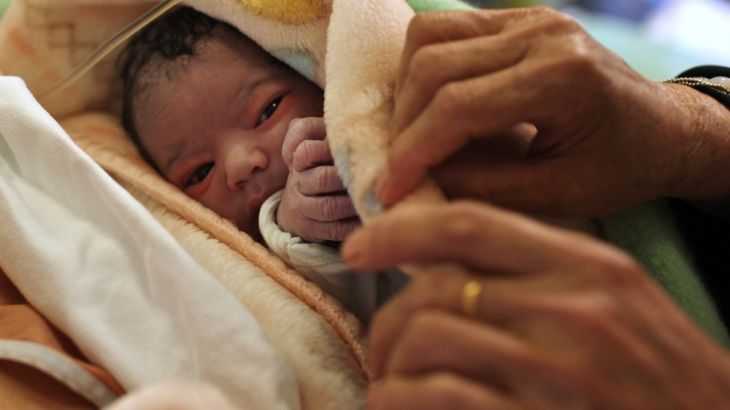
Sperm Smugglers
How Palestinians serving long sentences in Israeli jails enable their wives to conceive in their absence using IVF.
Filmmaker: Muhammad Mustafa al-Sawaf
“I wish he could be with us now to raise his child and to care for him,” says May, the wife of Fahmi Abu Salah, a Palestinian prisoner who is serving a 22-year sentence in an Israeli prison. “It would be the greatest happiness.”
Keep reading
list of 4 itemsWhat happens when activists are branded ‘terrorists’ in the Philippines?
Are settler politics running unchecked in Israel?
Post-1948 order ‘at risk of decimation’ amid war in Gaza, Ukraine: Amnesty
May and Fahmi’s child, Asaad, was conceived through in-vitro fertilisation (IVF) after Fahmi’s sperm was smuggled to a clinic in the Gaza Strip. He is one of 32 babies born to the wives of Palestinian prisoners over a three-year span.
What guarantees can a prisoner give, apart from his sperm? It's the only way for him to make sure his wife won't leave him. This way, she will feel safer, and that life will go on.
Raising babies conceived from sperm smuggled from Israeli prisons is both a source of hope and a form of protest for prisoners, their wives and families.
Rawhi Mushtaha was serving time in an Israeli prison in 2004 when he first had the idea to smuggle his sperm. “I thought the biggest obstacle was to convince our families,” he says. “The prisoners themselves were barely convinced, so what about our families? It wouldn’t be easy for them to see my wife pregnant while I was held in detention.”
Rawhi wrote a letter to his family. By the time of their next visit to him in prison, they had a response: “My father said, ‘Why didn’t you think of this before?’ I was shocked.” He transferred three sperm samples to his wife Raeda, but several attempts and many visits to the clinic proved fruitless.
“If God wanted us to have kids, then one of those 10 times would have worked,” she says. “But everything is destined to be. I absolutely believe in God’s will.”
But the idea gradually took hold and grew into a form of political dissent.
“The prisoners realised it wasn’t a matter of social values and traditions,” says Tawfiq Abu Naim, another former prisoner. “It’s become a war between them and their jailers. The prisoners understand the confrontation and challenge between them and the jailer. So they try to come up with every possible way to break the barrier, get their sperm samples out, to defeat the jailer and reproduce… even when they’re in prison.”
But by the time the birth of babies conceived with smuggled sperm peaked in 2015, the Israeli authorities clamped down, tightening visitation rights and making it more difficult for prisoners to smuggle their sperm.
To make matters more difficult, Israel has denied identification documents or legal status of any kind to babies born from smuggled sperm. Babies born this way are also denied visitation rights to their imprisoned fathers.
“We applied for baby Asaad to visit his father in prison,” explains Asaad Abu Salah, the toddler’s grandfather, himself a former prisoner. “We talked with the Red Cross. They said this child is illegitimate and unrecognised by the Israeli occupation and prisons authority… these children are illegitimate and will not have ID cards. If the occupation continues, these children will not be registered in Gaza’s civil records and will be banned from travelling. They will remain without any documents to prove their identities. They’re unrecognised by the authorities, as if they don’t exist.”
But despite the hurdles, Asaad remains a source of hope for his mother, May.
“Just as he managed to get his sperm sample smuggled out of prison, he will also be released,” she says. “My dream has come true. Hopefully, it will become even better when my husband is released.”
|
|